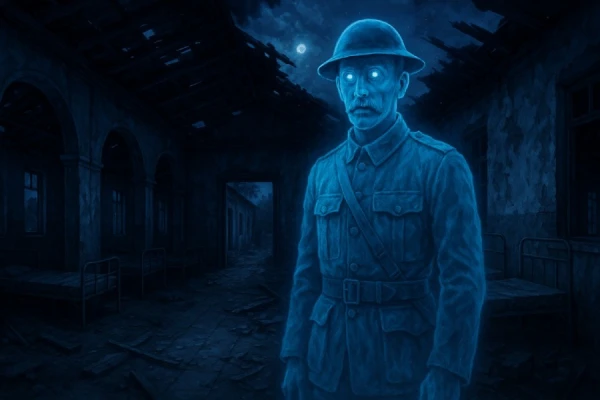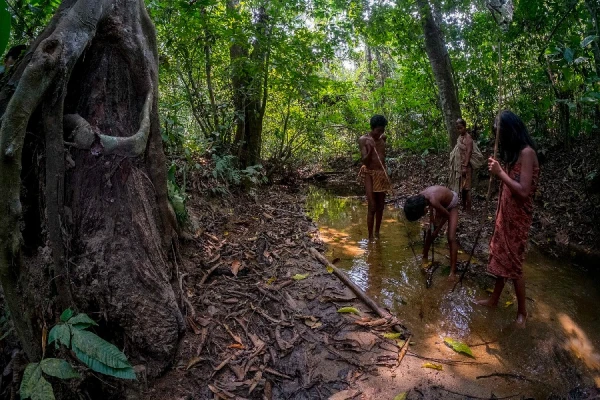“What? Really?!” That was the first sentence I uttered upon realizing, in my forties, that the barracks where I grew up—called "Tangsi" by the locals—holds historical significance that is still remembered today. Various articles describe this Dutch building, constructed around 1914, as a place rich with priceless historical stories. Located on Jalan Melati, it used to stand behind the Teacher Training School. On the right side of Jalan Melati, there is the Courthouse building, which is also said to be Dutch in origin. The Tangsi was once used as a detention center for Dutch soldiers and government rebels. Although I didn’t stay there very long—from kindergarten through elementary school—I still vividly remember the horror incidents at the Tangsi and the old well near the SPG Boyolali field. I can hardly believe I once lived in a place so rich in history.
JOIN ME AS I SHARE MY TRUE STORY!!!
At first, I never imagined that what I experienced while living at the Tangsi military barracks in Boyolali, Central Java, would become an unforgettable tale throughout my life—seeing ghosts, being sick and unable to walk for three months, which, according to a spiritual healer, was caused by possession by a Dutch spirit.
What kind of ghost did I see? How did I become possessed by a wandering spirit? Read on and discover my story!
I was born as the fourth of six children to a soldier father who was initially stationed in Srondol, Central Java. Born in 1970, it was an era far from modern. It’s undeniable that soldiers could be reassigned anywhere at any time. When I was five, my family moved with my father from Srondol to the Boyolali Military Command (Kodim). My school was near the Tangsi, named TK PERSIT.
My family was housed in a military barracks shared by three families. The building exuded a serene atmosphere with its Dutch architectural style. For communal activities, there was a well located right next to my parents’ room. My siblings and I had bedrooms adjacent to my parents’ room.
The building’s construction date—1914—is inscribed on a window near the ceiling. Quite old indeed. Behind the barracks were rooms with iron bars on the windows. As a child, I didn’t fully understand their purpose back then; now, it looks like a prison.
Just about a week after moving in, my sister and I shared a large iron bed in my room. Since the room was spacious, there were two beds. There were two for my brothers, but my youngest sibling wasn’t born yet (he was born in Boyolali in 1981). We were three girls and two boys. Back then, soldier families had many children as family planning wasn’t common.
My father, a soldier, had weekly guard duty at the Kodim, and that’s when the first strange incident occurred—one my siblings still remember to this day.
One night, in our room, my siblings and I heard the sound of a stick knocking and moving, shifting under the bed. My sister, brother, and I were terrified and moved to my mother’s room. We couldn’t sleep; the stick’s tapping even followed us into my mother’s room.
My mother panicked, and so did we. We could only stay silent, helpless. After about an hour, the noise stopped. I remained scared in my mother's room, waiting for my dad to come home. Two hours later, when he arrived, he was shocked to find us all asleep on one bed with our mother. When we told him what happened, he dismissed it as hallucination—likely to discourage us from believing in ghosts in the barracks.
As the saying goes, seeing is believing. The next night, my father wasn’t on guard duty and could sleep with me. Since then, I was used to going to bed before 9 p.m., following my father's strict military discipline.
At 1 a.m., I awoke to hear my father’s voice, seemingly commanding the disturbing tapping noise. I overheard his words as if communicating with the intruder: “I’m on duty here, don’t disturb my children!” and “We don’t disturb you.”
After that, the tapping ceased. Yet, I was still afraid and wouldn’t sleep with my older brother. The next day, my father asked neighbors if they’d heard anything similar. Only our family experienced such disturbances, and only briefly.
A little about my father: he was born in Solo and his father worked at the palace in Surakarta. Fortunately, a neighbor in the Tangsi had spiritual knowledge. After talking with him, my father sought out the origin of the disturbance. Apparently, it was the spirit of a blind Dutch soldier who had once died there, known to walk with a cane. My father was advised to fulfill the spirit’s request, after which the cane sounds ceased at night.
I thought the restless spirit stopped bothering us, but more unrest followed—even without a physical form, it was terrifying. About a month later, four families living in the Tangsi began to wonder who was drawing water from the well around 2 a.m.
As mentioned earlier, a well beside my parents’ room was used for daily activities, with clear, clean spring water. We suddenly heard loud sounds of something falling into the well, along with the clattering of a bucket sliding down to the water source. It was strange because it wasn’t raining, and we always placed the bucket securely, so it wouldn’t fall. This wasn’t a one-time event either. I’ll share more about the well’s mystery later in my story.
Now, about my childhood mischief: like many children of military families back then, I was very mischievous. From kindergarten to elementary school, I enjoyed riding my bike in the SPG field, picking fruit, visiting the river on Jalan Pandanaran, and swimming in Kridanggo. I played with schoolmates and dorm friends.
My mother, besides being a housewife, loved volleyball. She often practiced at SPG, where there was a volleyball court and a spacious parade ground. Behind the field, near the classrooms, is a well connected to Jalan Melati in front of the barracks.
In the third grade, children my age liked playing house or market games. That day, while my mother was practicing volleyball at SPG, I joined my dorm friends to play. For playing house, we needed props from home, usually a long cloth or 'jarik' (traditional batik). My mother didn’t allow me to use her good jarik, so I borrowed an old but intact jarik of hers.
We wrapped the cloth around a bamboo staircase near the well to build a makeshift house. My mother’s volleyball practice ended before dusk, and the court was close to where we played near the well. That day, for the first time, my friends and I saw a ghost—perhaps it was warning us not to play past dusk.
True to myth, seeing a ghost leaves your mouth locked, unable to scream. We saw a tall figure with a disfigured face sitting on the well’s edge, one leg dangling inside, the other outside, smoking a large cigarette, with bright red hair. “Oh my God.” The sight was so terrifying I nearly fainted and forgot how to speak. The ghost stared at us viciously, maybe angry we disturbed its territory.
“NOOOO!!!” I just wanted to run away, not facing that fearsome face again.
All four of us ran screaming—though no words came out—towards the field to find my mother. I even pulled her old jarik along, which tore during the escape. My mother comforted me with water.
A nearby volleyball coach and neighbor with spiritual knowledge calmed us down. Even at home, I remained fearful, haunted by the ghost’s face. That was my first real encounter with a ghost. I once thought they wouldn’t appear unless provoked, but the experience defied logic. Truly terrifying!
Four months later, I suddenly couldn’t get out of bed because my legs were paralyzed. I had never been ill before. My mother cried as I called out to her, unable to move.
“Mom, I can’t walk!”
“I need to pee!” I called.
My mother doubted it at first but helped me to the bathroom as I wanted to shower. When I tried to stand, my legs gave out. My father was shocked and immediately took me to a spiritual healer, while he stayed home with my youngest sibling.
The journey to the healer's house was difficult. Standing tall, inheriting my father's approximate 190 cm height, I had to be carried by my mother across an unfinished bamboo bridge, crawling beneath. Despite the heaviness and distance, my mother never complained, determined to get me help—her dedication moves me to tears even as I write this. Both my parents have passed since then, making this memory even more precious.
My parents didn’t just rely on spiritual healing; I also saw doctors nearby and pediatric specialists in Solo. Luckily, a Chinese neighbor with a jewelry store kindly offered rides during my hospital visits.
I was ill for three months, unable to walk or attend school. The efforts to cure me medically and spiritually were relentless. I tired of bitter herbal medicines and rituals involving bathing in water infused with flowers and incense—yet I obeyed my mother.
Doctors were puzzled by my condition, even ordering lab tests—quite costly. Orthopedic hospitals in Solo were involved, and my father, despite his modest rank, served in the local council representing the military faction, so he found time to accompany me.
He even sold a government land plot to afford my treatments.
Thanks to my parents’ unyielding efforts, I eventually recovered and returned to school, catching up and passing my grade. To this day, I wonder if the supernatural really exists. The spiritual healer said I was possessed by a Dutch spirit because I played on its grave—although I cannot be sure if the barracks were built over an old burial ground.
This experience taught me to be very cautious when passing sacred or historical sites. We shouldn’t carelessly play in public places and must respect the time and place.
I have long wanted to write this story but only now found the right time. According to news and articles, the Tangsi was once a place where government rebels were cruelly tortured. Other sources describe prisoners committing suicide by jumping into the well I mentioned earlier.
I also remember entering an unused room near the bathroom with a circular coil of barbed wire on the ceiling—similar to instruments used in films for hanging people.
Another chilling fact is that the well at SPG might have been a mass grave site according to some articles—where bodies were disposed of after conflicts with the government. I share this story without intending to accuse anyone, understanding the complex issues of the past.
Ultimately, I’m grateful to have had a father who was a soldier stationed in a historically significant Tangsi. This story I write is a memento for my descendants. After my father’s service at Kodim Boyolali ended, our family moved to a transmigration area in Bangko, Jambi, in 1983, where I was raised.
That area was very isolated at the time, and I almost daily encountered the indigenous Anak Dalam tribe, which I have written about in a novel to be published here soon, God willing.
Thank you to all readers for taking the time to read my true story. I apologize for any imperfections in my writing or storytelling, and offer my deepest respect. Until the next story, Al-Fatiha for my late father, youngest brother, and my late mother—may they find peace in Allah’s heaven.
“What? Really?!” That was the first sentence I uttered upon realizing, in my forties, that the barracks where I grew up—called "Tangsi" by the locals—holds historical significance that is still remembered today. Various articles describe this Dutch building, constructed around 1914, as a place rich with priceless historical stories. Located on Jalan Melati, it used to stand behind the Teacher Training School. On the right side of Jalan Melati, there is the Courthouse building, which is also said to be Dutch in origin. The Tangsi was once used as a detention center for Dutch soldiers and government rebels. Although I didn’t stay there very long—from kindergarten through elementary school—I still vividly remember the horror incidents at the Tangsi and the old well near the SPG Boyolali field. I can hardly believe I once lived in a place so rich in history.
JOIN ME AS I SHARE MY TRUE STORY!!!
At first, I never imagined that what I experienced while living at the Tangsi military barracks in Boyolali, Central Java, would become an unforgettable tale throughout my life—seeing ghosts, being sick and unable to walk for three months, which, according to a spiritual healer, was caused by possession by a Dutch spirit.
What kind of ghost did I see? How did I become possessed by a wandering spirit? Read on and discover my story!
I was born as the fourth of six children to a soldier father who was initially stationed in Srondol, Central Java. Born in 1970, it was an era far from modern. It’s undeniable that soldiers could be reassigned anywhere at any time. When I was five, my family moved with my father from Srondol to the Boyolali Military Command (Kodim). My school was near the Tangsi, named TK PERSIT.
My family was housed in a military barracks shared by three families. The building exuded a serene atmosphere with its Dutch architectural style. For communal activities, there was a well located right next to my parents’ room. My siblings and I had bedrooms adjacent to my parents’ room.
The building’s construction date—1914—is inscribed on a window near the ceiling. Quite old indeed. Behind the barracks were rooms with iron bars on the windows. As a child, I didn’t fully understand their purpose back then; now, it looks like a prison.
Just about a week after moving in, my sister and I shared a large iron bed in my room. Since the room was spacious, there were two beds. There were two for my brothers, but my youngest sibling wasn’t born yet (he was born in Boyolali in 1981). We were three girls and two boys. Back then, soldier families had many children as family planning wasn’t common.
My father, a soldier, had weekly guard duty at the Kodim, and that’s when the first strange incident occurred—one my siblings still remember to this day.
One night, in our room, my siblings and I heard the sound of a stick knocking and moving, shifting under the bed. My sister, brother, and I were terrified and moved to my mother’s room. We couldn’t sleep; the stick’s tapping even followed us into my mother’s room.
My mother panicked, and so did we. We could only stay silent, helpless. After about an hour, the noise stopped. I remained scared in my mother's room, waiting for my dad to come home. Two hours later, when he arrived, he was shocked to find us all asleep on one bed with our mother. When we told him what happened, he dismissed it as hallucination—likely to discourage us from believing in ghosts in the barracks.
As the saying goes, seeing is believing. The next night, my father wasn’t on guard duty and could sleep with me. Since then, I was used to going to bed before 9 p.m., following my father's strict military discipline.
At 1 a.m., I awoke to hear my father’s voice, seemingly commanding the disturbing tapping noise. I overheard his words as if communicating with the intruder: “I’m on duty here, don’t disturb my children!” and “We don’t disturb you.”
After that, the tapping ceased. Yet, I was still afraid and wouldn’t sleep with my older brother. The next day, my father asked neighbors if they’d heard anything similar. Only our family experienced such disturbances, and only briefly.
A little about my father: he was born in Solo and his father worked at the palace in Surakarta. Fortunately, a neighbor in the Tangsi had spiritual knowledge. After talking with him, my father sought out the origin of the disturbance. Apparently, it was the spirit of a blind Dutch soldier who had once died there, known to walk with a cane. My father was advised to fulfill the spirit’s request, after which the cane sounds ceased at night.
I thought the restless spirit stopped bothering us, but more unrest followed—even without a physical form, it was terrifying. About a month later, four families living in the Tangsi began to wonder who was drawing water from the well around 2 a.m.
As mentioned earlier, a well beside my parents’ room was used for daily activities, with clear, clean spring water. We suddenly heard loud sounds of something falling into the well, along with the clattering of a bucket sliding down to the water source. It was strange because it wasn’t raining, and we always placed the bucket securely, so it wouldn’t fall. This wasn’t a one-time event either. I’ll share more about the well’s mystery later in my story.
Now, about my childhood mischief: like many children of military families back then, I was very mischievous. From kindergarten to elementary school, I enjoyed riding my bike in the SPG field, picking fruit, visiting the river on Jalan Pandanaran, and swimming in Kridanggo. I played with schoolmates and dorm friends.
My mother, besides being a housewife, loved volleyball. She often practiced at SPG, where there was a volleyball court and a spacious parade ground. Behind the field, near the classrooms, is a well connected to Jalan Melati in front of the barracks.
In the third grade, children my age liked playing house or market games. That day, while my mother was practicing volleyball at SPG, I joined my dorm friends to play. For playing house, we needed props from home, usually a long cloth or 'jarik' (traditional batik). My mother didn’t allow me to use her good jarik, so I borrowed an old but intact jarik of hers.
We wrapped the cloth around a bamboo staircase near the well to build a makeshift house. My mother’s volleyball practice ended before dusk, and the court was close to where we played near the well. That day, for the first time, my friends and I saw a ghost—perhaps it was warning us not to play past dusk.
True to myth, seeing a ghost leaves your mouth locked, unable to scream. We saw a tall figure with a disfigured face sitting on the well’s edge, one leg dangling inside, the other outside, smoking a large cigarette, with bright red hair. “Oh my God.” The sight was so terrifying I nearly fainted and forgot how to speak. The ghost stared at us viciously, maybe angry we disturbed its territory.
“NOOOO!!!” I just wanted to run away, not facing that fearsome face again.
All four of us ran screaming—though no words came out—towards the field to find my mother. I even pulled her old jarik along, which tore during the escape. My mother comforted me with water.
A nearby volleyball coach and neighbor with spiritual knowledge calmed us down. Even at home, I remained fearful, haunted by the ghost’s face. That was my first real encounter with a ghost. I once thought they wouldn’t appear unless provoked, but the experience defied logic. Truly terrifying!
Four months later, I suddenly couldn’t get out of bed because my legs were paralyzed. I had never been ill before. My mother cried as I called out to her, unable to move.
“Mom, I can’t walk!”
“I need to pee!” I called.
My mother doubted it at first but helped me to the bathroom as I wanted to shower. When I tried to stand, my legs gave out. My father was shocked and immediately took me to a spiritual healer, while he stayed home with my youngest sibling.
The journey to the healer's house was difficult. Standing tall, inheriting my father's approximate 190 cm height, I had to be carried by my mother across an unfinished bamboo bridge, crawling beneath. Despite the heaviness and distance, my mother never complained, determined to get me help—her dedication moves me to tears even as I write this. Both my parents have passed since then, making this memory even more precious.
My parents didn’t just rely on spiritual healing; I also saw doctors nearby and pediatric specialists in Solo. Luckily, a Chinese neighbor with a jewelry store kindly offered rides during my hospital visits.
I was ill for three months, unable to walk or attend school. The efforts to cure me medically and spiritually were relentless. I tired of bitter herbal medicines and rituals involving bathing in water infused with flowers and incense—yet I obeyed my mother.
Doctors were puzzled by my condition, even ordering lab tests—quite costly. Orthopedic hospitals in Solo were involved, and my father, despite his modest rank, served in the local council representing the military faction, so he found time to accompany me.
He even sold a government land plot to afford my treatments.
Thanks to my parents’ unyielding efforts, I eventually recovered and returned to school, catching up and passing my grade. To this day, I wonder if the supernatural really exists. The spiritual healer said I was possessed by a Dutch spirit because I played on its grave—although I cannot be sure if the barracks were built over an old burial ground.
This experience taught me to be very cautious when passing sacred or historical sites. We shouldn’t carelessly play in public places and must respect the time and place.
I have long wanted to write this story but only now found the right time. According to news and articles, the Tangsi was once a place where government rebels were cruelly tortured. Other sources describe prisoners committing suicide by jumping into the well I mentioned earlier.
I also remember entering an unused room near the bathroom with a circular coil of barbed wire on the ceiling—similar to instruments used in films for hanging people.
Another chilling fact is that the well at SPG might have been a mass grave site according to some articles—where bodies were disposed of after conflicts with the government. I share this story without intending to accuse anyone, understanding the complex issues of the past.
Ultimately, I’m grateful to have had a father who was a soldier stationed in a historically significant Tangsi. This story I write is a memento for my descendants. After my father’s service at Kodim Boyolali ended, our family moved to a transmigration area in Bangko, Jambi, in 1983, where I was raised.
That area was very isolated at the time, and I almost daily encountered the indigenous Anak Dalam tribe, which I have written about in a novel to be published here soon, God willing.
Thank you to all readers for taking the time to read my true story. I apologize for any imperfections in my writing or storytelling, and offer my deepest respect. Until the next story, Al-Fatiha for my late father, youngest brother, and my late mother—may they find peace in Allah’s heaven.
Conclusion
Lorem ipsum dolor sit amet, consectetur adipiscing elit, sed do eiusmod tempor incididunt ut labore et dolore magna aliqua. Ut enim ad minim veniam, quis nostrud exercitation ullamco laboris nisi ut aliquip ex ea commodo consequat. Duis aute irure dolor in reprehenderit in voluptate velit esse cillum dolore eu fugiat nulla pariatur. Excepteur sint occaecat cupidatat non proident, sunt in culpa qui officia deserunt mollit anim id est laborum.
Closing
Thank you for reading this true story. May it remind us all to appreciate history and maintain respect for our heritage, while strengthening our belief that unseen forces accompany us throughout life.








Responses